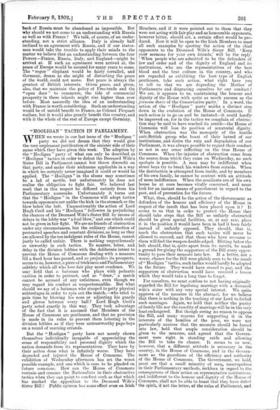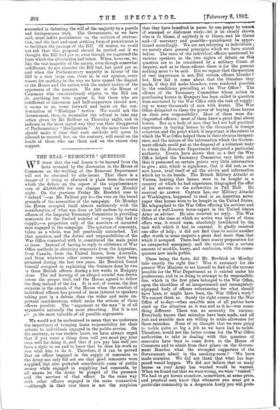• " HOOLIGAN " TACTICS IN PARLIAMENT.
WHEN we wrote in our last issue of the " Hooligan " party we did not dream that they would give the very unpleasant justification of the sinister side of their name which they have given this week. The adoption by the " Hooligan ' party of what can only be described as " Hooligan " tactics in order to defeat the Deceased Wife's Sister Bill in Parliament cannot but throw discredit on that party, and make their nickname applicable in a way in which we certainly never imagined it could or would be applied. The " Hooligan " in the slums may sometimes be a lad of mettle, but unfortunately he does not realise the obligation to fight fair. We believed last week that in this respect he differed entirely from his Parliamentary namesake. Unfortunately it turns out that the " Hooligan " in. the Commons will adopt tactics towards opponents not unlike the kick in the stomach or the blow below the belt. Unquestionably the action of Lord Hugh Cecil and his " Hooligan " followers in prejudicing the chances of the Deceased Wife's Sister Bill by means of delays in the lobby was "a foul blow," and one which could not be given in. fair fight. We are no friends of obstruction under any circumstances, but the ordinary obstruction of protracted speeches and constant divisions, as long as they are allowed by the too indulgent rules of the House, cannot justly be called unfair. There is nothing ungentlemanly or unworthy in such tactics. To saunter, loiter, and delay in the division lobbies with the deliberate intent to prevent the House of Commons dealing with a measure till a fixed hour has passed, and so prejudice its prospects, seems to us, however, a piece of trickiness andParliamentary subtlety which all who love fair play must condemn. We may hold that a batsman who plays with pedantic caution in order, to protract, and. so "draw," a match cannot be accused of any unfairness, even though we may regard his conduct as unsportsmanlike. But what should we say of a batsman who stooped to petty physical subterfuges in order to spin out the match,—who tried, to gain time by blowing his nose or adjusting his guards 4nd gloves between every ball ? Lord Hugh Cecil's party, acted exactly in this way. They took advantage of the fact that it is assumed that Members of the House of Commons are gentlemen, and that no provision is made in its rules a prevent them loitering in the division lobbies as if they were untrustworthy page-boys on a round of morning errands.
But the " Hooligan " party have not merely shown themselves individually incapable of appreciating the sense of responsibility and personal dignity which the nation demands from its representatives. They have by their action done what is infinitely worse. They have degraded and injured the House of Commons. The exhibition of Wednesday afternoon has set the worst possible example, and. one which is sure to be pleaded on future occasions. How can the House of Commons restrain and censure the Nationalists in their obstructive tactics when they can point to conduct such as that which has marked • the opposition to the Deceased Wife's Sister Bill ? Public opinion has some effect even on Irish Members, and if it were pointed. out to them that they were not acting with fair play and as honourable opponents, however bitter, should act, a certain effect would be pro- duced. Now it will be open to the Irish Members to meet all such examples by quoting the action of the chief opponents to the Deceased Wife's Sister Bill. Keep yout sermons for your own friends,' will be the reply. When people who are admitted to be the defenders of law and order and of the dignity of England and its institutions, who are the representatives of the best blood. and the best culture in the country, and who are regarded as exhibiting the best type of English gentlemen, take such action, what right have you to tell us that we are degrading the Mother of Parliaments and disgracing ourselves by our conduct? We are, it appears to us, maintaining the honour and dignity of the House with quite as much success as the jeunesse d,orge of the Conservative party.' In a word, the action of the " Hooligan " party marks a distinct step down in the evolution of the House of Commons. If such action is to go on and be imitated—it could hardly be improved. on, for in the tactics we complain of obstruc- tion may be said to have reached its zenith—the House of Commons will lose its position of senatorial dignity. When obstruction was the monopoly of the hostile anti-British group who boast of their hatred of our institutions, and desire the ruin and. degradation of our Parliament, it was always possible to regard. their conduct as not in any sense reflecting 'on the true House of Commons. When the injuries of obstruction come from the source from which they came on Wednesday, no such apologia is possible. A man may be indifferent when street boys try to break his windows from outside. When the destruction is attempted from inside, and by members of his own family, he cannot be content with an attitude of mere indifference. When the assailants are of his own house he at once becomes vitally concerned, and must look for an instant means of punishment in regard. to the past, and of prevention for the future.
What, then, should be the action of the Government as defenders of the honour and efficiency of the House in respect of the insult that has been placed upon it ? It seems to us that in order to protect the House they should. take steps that the Bill so unfairly obstructed. should be given special facilities, or, at any rate, place it in the position it would have been in had it been fairly instead of unfairly opposed. They should, that is, teach the obstructors that such tactics will never be allowed to succeed, and that those who have recourse to them will find the weapon double-edged. Hitting below the belt should, that is, quite apart from its merits, be made a ground for giving the supporters of the Bill every oppor- tunity to pass their measure into law. If a better, not a worse, chance for the Bill were plainly seen to be the result of" Hooligan "tactics, such tactics would "hardly be adopted in the future. They would have ceased to pay, and the supporters of obstruction would have received a lesson which they would take a long time to forget.
For ourselves, we must confess to not having originally regarded the Bill for legalising marriage with a deceased wife's sister with any very special interest. We quite approve of the measure in the abstract, for we believe that there is nothing in. the teaching of our Lord to forbid such marriages. Again, we hold that neither the purity of family life nor the sanctity of marriage will be in the very least endangered. But though seeing no reason to oppose the Bill, and. many reasons for supporting it in the interests of the families of the poor, we were not particularly anxious that the measure should be forced into law, held that ample consideration should be given to the measure, and agreed that the Govern- ment were right, in standing aside and allowing the Bill to take its chance. It seems to us now, however, that a different attitude is necessary in the country, in the House of Commons, and in the Govern- ment as the guardians of the efficiency and authority of the House of Commons. The Government, we hold, must see that a small minority of men, unscrupulous in their Parliamentary methods, reckless in regard to the consequences of their action on representative institutions, and indifferent to the honour and dignity of the House of Commons, shall not be able to boast that they have defied the spiri4 if not the letter, of the rules of Parliament, and succeeded in defeating the will of the majority by a puerile and disingenuous trick. The Government, as we have said, must inflict punishment on the authors of obstruc- tion, and the best and most striking form of punishment is to facilitate the passage of the Bid! Of course, we could not ask that this proposal should be carried out if we thought the Bill bad per se, even though we regretted•the form which the obstruction had taken. When, however, we, like the vast majority of the nation, even though somewhat indifferent, do not consider the Bill bad, but good per se, and when the Parliamentary majority in favour of the Bill is a very large one, there is, in our opinion, every reason for marking in the way we have named the disgust of the House and the nation with the unfair tactics of the opponents of the measure. No one in the House of Commons who conscientiously objects to the Bill can do anything but vote against it, but those who are indifferent or lukewarm and half-supporters should now, it seems to us, come forward and insist on the con- demnation of " Hooligan " tactics. We would ask the Government, then, to reconsider the refusal to take any action given by Mr. Balfour on Thursday night, and to indicate in the most signal way they can their disapproval of Parliamentary "Hooliganism." At the same time they should make it clear that such methods will never be allowed to succeed, but, on the contrary, will recoil on the heads of those who' use them and on the causes they support.











































 Previous page
Previous page